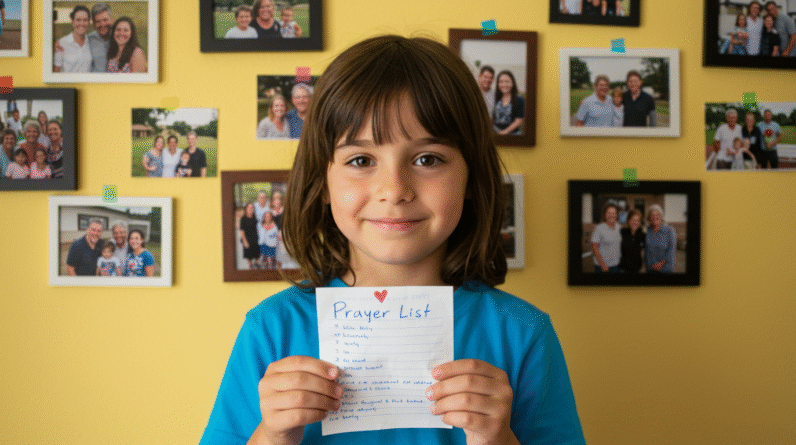The Power of Prayer in Parenting: Covering Your Children in Faith
Parenting is one of life’s most profound and challenging roles. From sleepless nights with a newborn to the tumultuous teenage years, every stage of raising a child comes with its own set of unique joys and trials. It’s a journey that requires patience, understanding, and love—qualities that can sometimes waver under the strain of daily life. Yet, there’s one constant that many parents find invaluable: the power of prayer.
Prayer in parenting isn’t just about seeking divine intervention in times of trouble, although there will certainly be plenty of those moments. It’s about weaving faith into the everyday fabric of family life, creating a nurturing environment where children can grow not just in stature, but in spirit as well.
Why Pray? The Foundation of Faith in Parenting
The simple act of prayer can provide solace, clarity, and strength when you’re feeling overwhelmed by parenting challenges. Through prayer, you can seek guidance, express gratitude, and ask for wisdom in making tough decisions. More importantly, prayer allows you to place your children into the hands of a loving and omnipotent God, which can be comforting when the world seems like a formidable place.
Prayer in parenting establishes a foundation of faith upon which a child’s life can be built. It’s like planting seeds in a garden; you might not immediately see the growth, but with time and nurturing, those seeds will blossom into something beautiful and resilient. Teaching children to seek God through prayer can give them a moral compass and a deep sense of security.
The Role of Prayer in Building Relationships
Incorporating prayer into your parenting can greatly deepen the relationship you have not only with your children but also with God. It’s an intimate way to connect with your children emotionally and spiritually. When you pray with your children, you show them how to articulate their thoughts and emotions, turning to a higher power for support and guidance.
Consider making prayer a shared practice. By praying together, you foster a sense of unity and trust within your family. Encourage your children to bring their concerns, no matter how small, to the family prayer time. This practice opens avenues for conversation and enables you to better understand their innermost hopes, fears, and dreams.
Practical Ways to Integrate Prayer into Family Life
Turning prayer into a consistent family habit might seem daunting at first, especially in our fast-paced lives filled with endless to-do lists and constant distractions. However, it’s the simple, intentional practices that often have the most profound impact.
Start and End Your Day with Prayer
Begin each day by thanking God for His blessings and asking for His guidance throughout the day. Morning prayers can set a positive tone and provide the spiritual fuel needed for the challenges ahead. Encourage your children to pray for their daily activities, whether it’s a school test or a soccer match, and ask for God’s presence in all they do.
End the day by reflecting on the day’s events, offering thanks for the good times, and seeking solace for any struggles. Evening prayers serve as a moment of peace and reflection, helping the family unwind and transition into a restful night’s sleep.
Create a Designated Prayer Space
Having a designated space for prayer can help instill a sense of reverence and focus. This doesn’t have to be an extravagant setup—perhaps a cozy corner with a few cushions, a small table for candles, and some meaningful religious symbols. The physical space can act as a visual reminder to prioritize prayer amidst the chaos of daily life.
Pray Through Everyday Moments
Prayer doesn’t have to be confined to morning or bedtime. Transform everyday moments into opportunities for dialogue with God. Offer a prayer of gratitude before meals, or pause to pray for safety before embarking on a road trip. Encourage your children to say a silent prayer before tests or important events.

Teaching Children the Value of Prayer
Children learn the importance of prayer not only by seeing but also by doing. As parents, you’re the primary role model for your children, and your practice of prayer in your parenting journey will serve as their template. Here’s how you can teach your children about the significance of prayer:
Be a Role Model
Children are incredibly perceptive and are more likely to adopt behaviors they observe in you. Demonstrate the value of prayer by making it an integral part of your life, not just when it’s convenient. Share with them when prayer has brought you comfort, guidance, or a sense of peace in challenging times.
Explain the Meaning and Purpose
Children, especially younger ones, may not inherently understand why prayer is essential. Take the time to explain its purpose—not as a wish list for material desires but as a means of building a relationship with God. Use simple language and relatable analogies to make the concept accessible to them.
Encourage Personal Prayers
Empower your children to develop their relationship with God by encouraging them to pray alone. Provide them with examples of simple prayers, but give them the freedom to express themselves in their own words. Assure them that there is no wrong way to pray and that God listens to all sincere prayers.
Scriptural Encouragement and Guidance
Scripture offers a wealth of encouragement and guidance for praying parents. Here are some verses to support you on this journey of faith:
- Trust and Security: Psalm 91 assures us of God’s protection, a reminder that when you pray for your children, they are shielded by His divine care. Psalm 91.
- Wisdom and Guidance: James 1:5 invites us to ask God for wisdom, a crucial aspect of parenting as you navigate difficult choices. James 1:5.
- Strength and Courage: Isaiah 41:10 provides comfort in the face of fear, an ever-present challenge in parenting. God assures us that He will strengthen and uphold us. Isaiah 41:10.
- Encouragement and Hope: Romans 15:13 speaks of the hope and joy that come from trusting in God—a hope you can pass on to your children through your prayers. Romans 15:13.
- Peace and Comfort: Philippians 4:6-7 reminds us to present our requests to God with thanksgiving, promising the peace of God, which transcends all understanding, will guard our hearts and minds. Philippians 4:6-7.
The Impact of Prayer on Family Life
Prayer isn’t just a spiritual practice—it’s a transformative tool that can impact every facet of family life. Here are some ways consistent prayer can influence your parenting journey:
Promotes Emotional Well-being
The discipline of prayer creates a space for individuals to process emotions and find clarity. It can help children develop emotional intelligence as they learn to articulate their feelings and concerns. Prayer becomes a therapeutic practice where the weight of worries can be shared and lifted in God’s presence.
Strengthens Family Bonds
Family prayers foster a shared sense of purpose and belonging. It’s a time to come together in unity, reinforcing bonds through shared faith experiences. This routine nurtures an environment of open communication and mutual support, vital components of a close-knit family.
Encourages a Spirit of Gratitude
Living in a state of constant prayer fosters gratitude for the blessings in your life. As you model thankfulness in prayer, your children learn to focus on what they have rather than what they lack, cultivating a grateful heart.
Provides a Moral Framework
Prayer in parenting helps instill strong moral values and a sense of accountability in children. Grounded in faith, children are more likely to develop a sense of right and wrong guided by their relationship with God, impacting their decisions and actions.
Overcoming Challenges in a Busy World
Incorporating prayer into family life can encounter obstacles, particularly in a world that often feels unaccommodating to spiritual practices. Rather than view prayer as one more item on an already bursting to-do list, it helps to reframe it as a foundational pillar upon which other family activities can be built.
Find What Works for Your Family
Each family is unique, and no one-size-fits-all approach exists. Some families thrive with structured prayer times, while others benefit from flexibility. Experiment with different formats, lengths, and frequencies to find what resonates most with your family dynamic.
Prioritize Consistency Over Perfection
Maintaining consistent family prayer can be more effective than aiming for a perfect setup. Life is unpredictable, and maintaining rigid routines isn’t always feasible. Focus on consistency and intention rather than achieving the ideal prayer moment.
Don’t Be Discouraged by Distractions
It’s common for life’s distractions to interrupt prayer time, especially with young children. Whenever interruptions occur, gently steer attention back to prayer without frustration. Over time, children learn the importance of focus and the special nature of prayer time.
Adapting Prayer to Different Ages and Stages
As children grow, their understanding and engagement with prayer will naturally evolve. Adapting your approach can help maintain their interest and ensure it remains a meaningful practice throughout different stages of their development.
For Young Children
Preschoolers and early elementary-aged children are naturally curious and eager to learn. Keep prayers simple and relatable, using language they understand. Incorporate storytelling and songs to maintain their interest and make prayer a fun and engaging activity.
For Tweens and Teenagers
As children develop more complex thought processes, they may question or challenge faith practices, including prayer. Encourage them to express their ideas and doubts openly. Family prayer sessions can become opportunities for discussion and theological exploration, helping deepen their understanding and commitment to faith.
For Young Adults
As your children enter adulthood and begin making their own decisions, prayer becomes their journey. Although they may not always join family prayer, continue to support their relationship with God. Respect their autonomy and trust in the foundation you have laid through years of prayerful parenting.
Celebrating the Wins, Big and Small
It’s important to celebrate the positive impacts of prayer on your family, no matter how seemingly insignificant they might be. Whether witnessing an attitude change in your child after a particularly thoughtful prayer session or hearing them sincerely intercede for a friend, these small victories are worth recognizing.
Share with your family the moments where prayer has tangibly influenced a situation or provided comfort. Celebrating these instances reinforces the power and presence of prayer in your family’s life and encourages the continuation of this impactful practice.
The Legacy of Prayer in Parenting
As you walk the path of integrating prayer into your parenting, remember that you are not only providing a spiritual foundation for your children but also creating a lasting legacy. This legacy isn’t about perfection; it’s about persistence, love, and an unwavering faith that your children can carry with them throughout their lives.
In the end, the power of prayer in parenting is not measured in immediate results but in the slow and steady spiritual growth of your children. It’s a journey filled with hope, faith, and the assurance that God listens and cares for each step along the way.
Explore More
For further reading and encouragement, check out these posts:
👉 7 Bible Verses About Faith in Hard Times
👉 Job’s Faith: What We Can Learn From His Trials
👉 How To Trust God When Everything Falls Apart
👉 Why God Allows Suffering – A Biblical Perspective
👉 Faith Over Fear: How To Stand Strong In Uncertain Seasons
👉 How To Encourage Someone Struggling With Their Faith
👉 5 Prayers for Strength When You’re Feeling Weak

📘 Jesus and the Woman Caught in Adultery – Grace and Mercy Over Judgement
A powerful retelling of John 8:1-11. This book brings to life the depth of forgiveness, mercy, and God’s unwavering love.
👉 Check it now on Amazon
As a ClickBank Affiliate, I earn from qualifying purchases.
Acknowledgment: All Bible verses referenced in this article were accessed via Bible Gateway (or Bible Hub).
“Want to explore more? Check out our latest post on Why Jesus? and discover the life-changing truth of the Gospel!”








